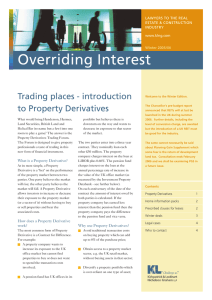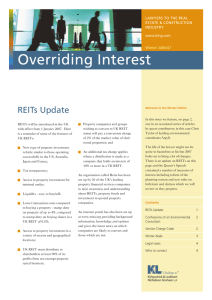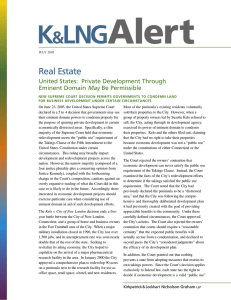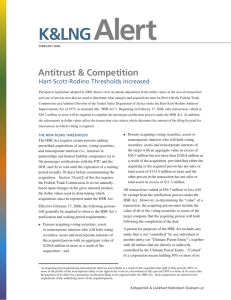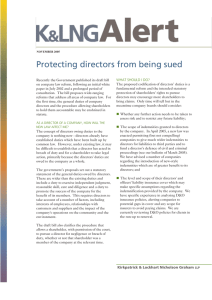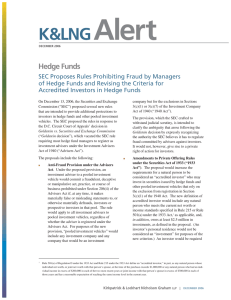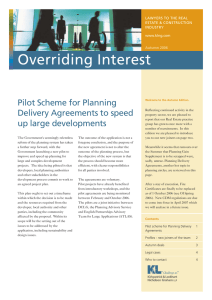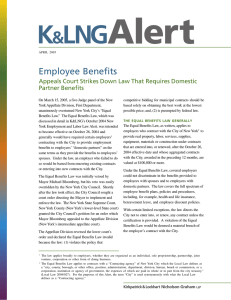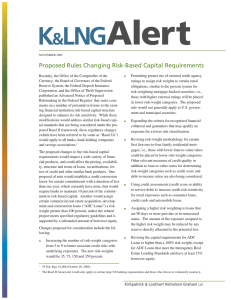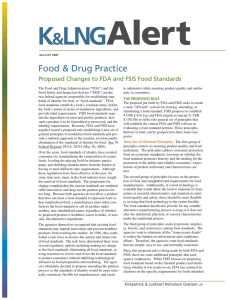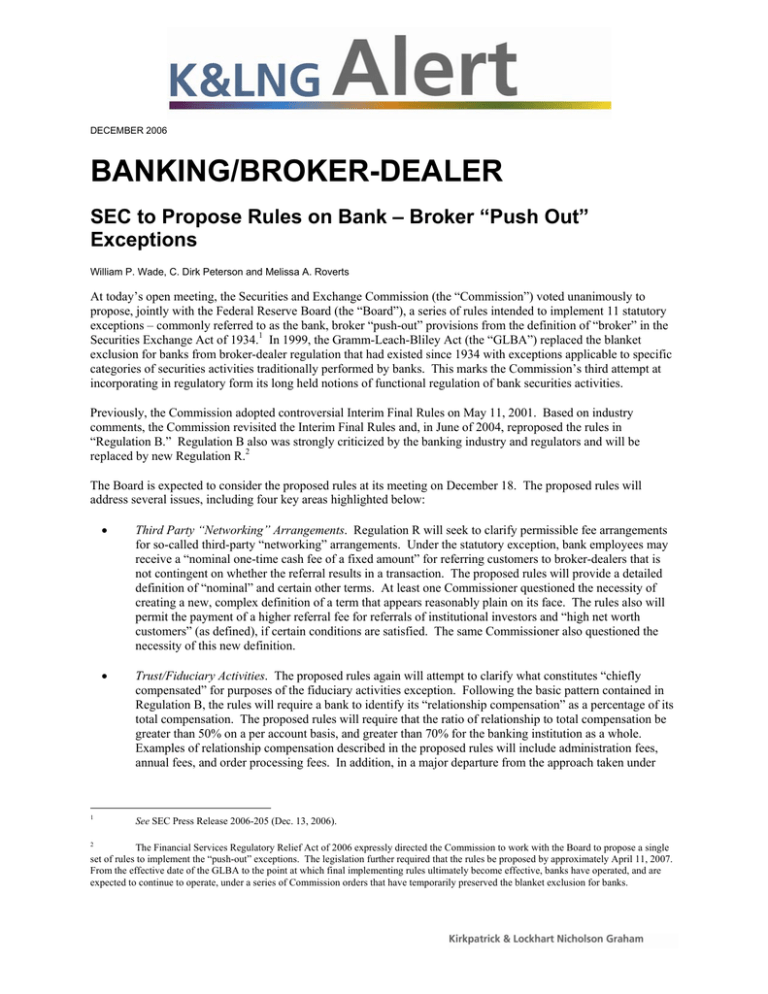
DECEMBER 2006
BANKING/BROKER-DEALER
SEC to Propose Rules on Bank – Broker “Push Out”
Exceptions
William P. Wade, C. Dirk Peterson and Melissa A. Roverts
At today’s open meeting, the Securities and Exchange Commission (the “Commission”) voted unanimously to
propose, jointly with the Federal Reserve Board (the “Board”), a series of rules intended to implement 11 statutory
exceptions – commonly referred to as the bank, broker “push-out” provisions from the definition of “broker” in the
Securities Exchange Act of 1934.1 In 1999, the Gramm-Leach-Bliley Act (the “GLBA”) replaced the blanket
exclusion for banks from broker-dealer regulation that had existed since 1934 with exceptions applicable to specific
categories of securities activities traditionally performed by banks. This marks the Commission’s third attempt at
incorporating in regulatory form its long held notions of functional regulation of bank securities activities.
Previously, the Commission adopted controversial Interim Final Rules on May 11, 2001. Based on industry
comments, the Commission revisited the Interim Final Rules and, in June of 2004, reproposed the rules in
“Regulation B.” Regulation B also was strongly criticized by the banking industry and regulators and will be
replaced by new Regulation R.2
The Board is expected to consider the proposed rules at its meeting on December 18. The proposed rules will
address several issues, including four key areas highlighted below:
1
•
Third Party “Networking” Arrangements. Regulation R will seek to clarify permissible fee arrangements
for so-called third-party “networking” arrangements. Under the statutory exception, bank employees may
receive a “nominal one-time cash fee of a fixed amount” for referring customers to broker-dealers that is
not contingent on whether the referral results in a transaction. The proposed rules will provide a detailed
definition of “nominal” and certain other terms. At least one Commissioner questioned the necessity of
creating a new, complex definition of a term that appears reasonably plain on its face. The rules also will
permit the payment of a higher referral fee for referrals of institutional investors and “high net worth
customers” (as defined), if certain conditions are satisfied. The same Commissioner also questioned the
necessity of this new definition.
•
Trust/Fiduciary Activities. The proposed rules again will attempt to clarify what constitutes “chiefly
compensated” for purposes of the fiduciary activities exception. Following the basic pattern contained in
Regulation B, the rules will require a bank to identify its “relationship compensation” as a percentage of its
total compensation. The proposed rules will require that the ratio of relationship to total compensation be
greater than 50% on a per account basis, and greater than 70% for the banking institution as a whole.
Examples of relationship compensation described in the proposed rules will include administration fees,
annual fees, and order processing fees. In addition, in a major departure from the approach taken under
See SEC Press Release 2006-205 (Dec. 13, 2006).
2
The Financial Services Regulatory Relief Act of 2006 expressly directed the Commission to work with the Board to propose a single
set of rules to implement the “push-out” exceptions. The legislation further required that the rules be proposed by approximately April 11, 2007.
From the effective date of the GLBA to the point at which final implementing rules ultimately become effective, banks have operated, and are
expected to continue to operate, under a series of Commission orders that have temporarily preserved the blanket exclusion for banks.
Regulation B, relationship compensation also will include 12b-1 fees, which were acknowledged to
constitute an integral part of banks’ compensation for fiduciary services.
•
Sweep Accounts. The proposed rules will define terms used in the statutory exception that permits banks to
“sweep” deposits into no-load money market mutual funds or funds that are not no-load, if the bank
provides the customer the prospectus showing the fund’s fees and does not characterize the fund as no-load.
The rules also are expected to require that a “banking relationship” exist between the bank and the
customer that is not based exclusively on money market fund transactions.
•
Safekeeping and Custody. As part of its “customary banking activities,” a bank is permitted to engage in
certain types of securities activities, including providing safekeeping and custody and other services for
employee benefit plans and other customers. Regulation B’s treatment of this exception generated
significant controversy between the Commission and the banking industry. The new rules will seek to
address the hot button issue of when and under what circumstances a bank may accept orders for, and be
compensated for, securities transactions in connection with safekeeping and custody accounts.
The Commission also voted to further extend the temporary blanket exemption for banks from the definition of
“broker” to July 2, 2007. The proposed rules would provide an 18-month transitional exemption extending to the
first day of a bank’s first fiscal year commencing after June 30, 2008.
Although the Commission voted unanimously to propose the new rules, consistent with the controversy that has
surrounded this topic since the first proposals in 2001, the Commissioners expressed differing reactions to them.
Chairman Cox and Commissioner Casey expressed full support of the proposals and hailed the cooperative efforts
among the various agencies involved. Commissioner Atkins criticized the density and micro-management style of
the rules. Commissioner Campos noted that Regulation R is considerably broader and more favorable to banks than
Regulation B had been, and questioned whether that approach is in the best interest of investors. Commissioner
Nazareth disagreed with Commissioner Atkins’ skepticism, and expressed the hope that commenters will respect the
“spirit of flexibility of Regulation R.”
We anticipate issuing additional analyses of specific aspects of the proposed rules, which will be published in the
Federal Register shortly and provide for a 90-day comment period.
* * *
If you have any questions or would like more information about K&LNG’s Banking or Broker-Dealer Practice,
please contact once of our lawyers listed below:
BOSTON
Mark P. Goshko
617.261.3163
mgoshko@klng.com
NEW YORK
Richard D. Marshall
212.536.3941
rmarshall@klng.com
LOS ANGELES
William P. Wade
310.552.5071
wwade@klng.com
SAN FRANCISCO
Elaine A. Lindenmayer
415.249.1043
elindenmayer@klng.com
WASHINGTON
Diane E. Ambler
202.778.9886
dambler@klng.com
C. Dirk Peterson
202.778.9324
dpeterson@klng.com
Donald W. Smith
202.778.9079
dsmith@klng.com
Rebecca H. Laird
202.778.9038
rlaird@klng.com
Ira L. Tannenbaum
202.778.9350
itannenbaum@klng.com
Kirkpatrick & Lockhart Nicholson (K&LNG) has approximately 1,000 lawyers and represents entrepreneurs, growth and middle market companies, capital markets
participants, and leading FORTUNE 100 and FTSE 100 global corporations nationally and internationally.
K&LNG is a combination of two limited liability partnerships, each named Kirkpatrick & Lockhart Nicholson LLP, one qualified in Delaware, U.S.A. and practicing
from offices in Boston, Dallas, Harrisburg, Los Angeles, Miami, Newark, New York, Palo Alto, Pittsburgh, San Francisco and Washington and one incorporated in
England practicing from the London office.
This publication/newsletter is for informational purposes and does not contain or convey legal advice. The information herein should not be used or relied upon in
regard to any particular facts or circumstances without first consulting a lawyer.
Data Protection Act 1988—We may contact you from time to time with information on Kirkpatrick & Lockhart Nicholson LLP seminars and with our regular
newsletters, which may be of interest to you. We will not provide your details to any third parties. Please e-mail london@klng.com if you would prefer not to
receive this information.
© 2006 KIRKPATRICK & LOCKHART NICHOLSON GRAHAM LLP. ALL RIGHTS RESERVED.



